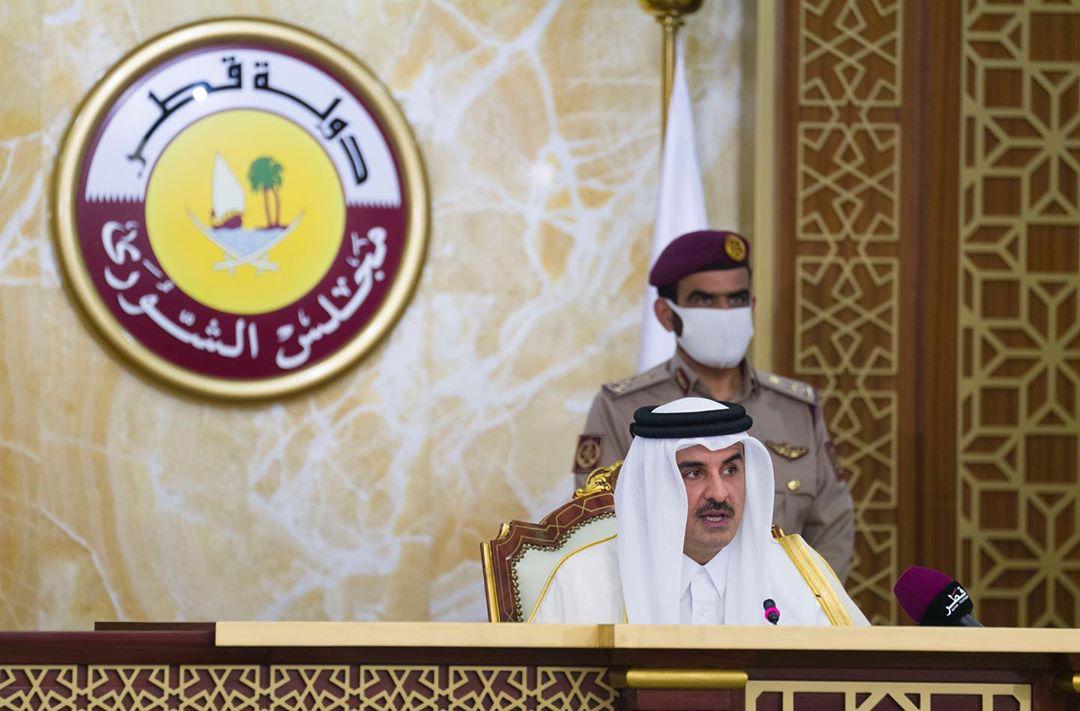The Amir addressed several issues, including tax exemptions, an upcoming advisory panel election, and the ongoing blockade, in his speech to the Shura Council on Tuesday.
Qatar’s Amir Sheikh Tamim bin Hamad Al Thani announced on Tuesday that the country will hold long-promised elections for its top advisory panel next year, more than 15 years since it was first ratified.
The Amir’s announcement came as part of his inaugural speech at the Shura Council legislative body. Sheikh Tamim said that the first-ever vote will take place in October 2021, describing it as “an important step” for the Gulf state in order to “develop the legislative process with a wider participation of citizens”.
“We have our well-established system which is rooted in and intertwined with the structure of our community. It is not a multiparty system, but rather an emirate system based on well-established traditions of fair and rational governance which is connected with the people through the pledge of allegiance, loyal relations, mutual trust and direct communication between the system and community,” said the Amir in his speech.
Approved in a 2003 referendum, the country’s constitution calls for the election of 30 seats of the country’s Shura Council, with the voting carried out in a secret ballot. The other 15 seats are appointed by the Amir.
Blockade
During the speech, the Amir also addressed the unjust blockade on Qatar, saying it has only strengthened the country’s international role due to its self-reliance and openness to dialogue.
“Despite the continued unjust blockade for more than three years, Qatar’s international status is being strengthened by the intensification of our activity on issues of concern to the international community, such as climate change, combating poverty, fighting terrorism,” said the Amir in his statement.
Sheikh Tamim also took the time to mention the loss of key regional mediators and leaders, Kuwait’s Sheikh Sabah and Oman’s Sultan Qaboos.
Read also: Kuwait to ‘continue efforts’ to end Gulf crisis: PM
“Our Arab ummah lost this year two of the greatest men in the Gulf, namely, His Majesty Sultan Qaboos, the builder of modern Oman, who maintained a mutual relation of fraternity and cordiality with Qatar, and His Highness Sheikh Sabah, who acted with all his strength to reconcile between Arab countries and to heal the rift in the Gulf, and whose positions with us we will never forget,” he said.
COVID-19
Commenting on the coronavirus pandemic, Sheikh Tamim praised his country’s measures to curb the spread of the virus, describing Qatar as “one of the world’s least affected countries”.
“The results of our health policies and persistent investment in developing the health system and medical staff, including prevention, daycare centres and hospitals, have been evident,” said the Amir.
Read also: WHO praises Qatar’s low COVID-19 mortality rate as ‘model for global emulation’
He also further discussed the country’s international role in helping other nations handle the pandemic by providing crucial and necessary assistance.
“We have supported the efforts of the international community and provided necessary assistance to more than seventy countries and international organisations. We will continue to support international efforts to accelerate the development of a necessary vaccine and make it affordable in a fair way to the neediest countries.”
Economy
The Amir also addressed the economic hurdles that came with the global health crisis.
According to Sheikh Tamim, Qatar’s official reserves continued to grow during the year and the deposits of the financial sector expanded, further proving the strength of the Qatari Riyal currency.
“The Qatari riyal also proved its strength and potential against external crises as it preserved its value and exchange freedom.”
Qatar will base its budget on oil at $40 a barrel, below what markets expect, as the country seeks to reduce the impact on its economy.
Read also: What would a Biden presidency look like for Qatar, GCC region?
“The energy sector in the State was able to overcome the repercussions of this pandemic with minimal detriments,” said Amir. “Qatar Petroleum has continued to fulfill its obligations towards all contracting parties. Also the workflow proceeds unhindered in the main energy projects, namely, the liquefied gas production expansion project, in addition to projects overseas.”
Normalisation
The Palestinian case was not left out from the Amir’s speech, where he reiterated Qatar’s position on the illegal Israeli occupation.
Echoing earlier comments, Sheikh Tamim said that peace in the Middle East cannot be achieved as long as the occupation on Palestinian continues and its people denied the ability to exercise their legitimate rights.
“Concerning our region, we reaffirm our steadfast position regarding the just Palestinian cause and the legitimate rights of our Palestinian brothers, including the establishment of their independent state on the basis of 1967 borders, with East Jerusalem as its capital, and a just solution to the refugees issue, under international legitimacy resolutions,” he said.
Read also: 90% of Qatar, Kuwait populations reject Israeli normalisation: survey
Following several allegations about Qatar normalising with the occupying Israeli state, the Amir emphasised that his country will not follow the footsteps of the UAE, Bahrain and Sudan, all of which formalised ties with Tel Aviv in an official signing ceremony at the White House in September.
“The normalisation of relations with Israel without a just solution to the problem of Palestine is a mere illusion.”
Follow Doha News on Twitter, Instagram, Facebook and Youtube







